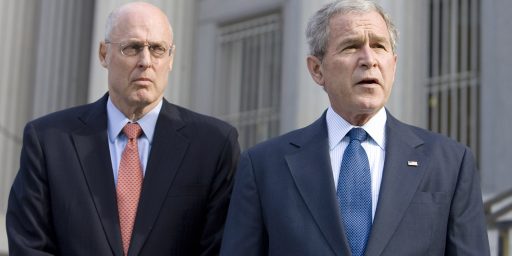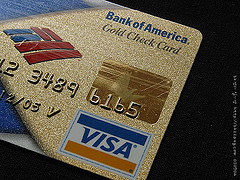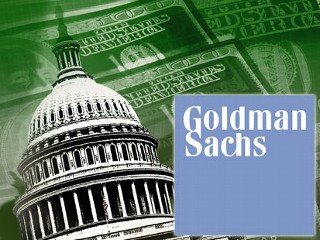Transparency? You Don’t Need Transparency
This Bloomberg article is noting that the Federal Reserve is refusing to disclose information on $2,000,000,000,000 in emergency loans. And yes, that is trillions, not billions.
Nov. 10 (Bloomberg) — The Federal Reserve is refusing to identify the recipients of almost $2 trillion of emergency loans from American taxpayers or the troubled assets the central bank is accepting as collateral.
Fed Chairman Ben S. Bernanke and Treasury Secretary Henry Paulson said in September they would comply with congressional demands for transparency in a $700 billion bailout of the banking system. Two months later, as the Fed lends far more than that in separate rescue programs that didn’t require approval by Congress, Americans have no idea where their money is going or what securities the banks are pledging in return.
So why might the Fed want to keep this all secret? Well to keep things from going to Hell in a Handbasket. Suppose the Fed comes out with a list of exactly who has borrowed what and the collateral that was used. These firms might then be seen as being in trouble that could cause even more problems. So the mindset at the Fed is: What you don’t know is good for you.
On the other hand there is a number of potential problems here that this policy can create. First, it insulates firms from their poor decision making. The idea of a competitive market is that if you make mistakes, especially on a systematic basis, then you will be beaten by your competitors and force out of business. This is typically viewed as a good thing in the long run since it means that the badly managed firms are not going to be sticking around to mis-allocate resources and so forth. Second, there is the principle agent problem. The principle in this case is the American taxpayer, and our agent is the Fed. In principle agent problems the problem is getting the agent to act in accord with the wishes of the principle. I think it is fair to say that Bernanke and Paulson might think that they know what is best for the American economy and ignore the desires/wishes of the American taxpayer. This could be good or it could be bad. Problem is we’ll have know way of knowing until much later when either most if not all of that money is either repaid…or lost.
Of course there are other issues as well. Note that I shifted from American taxpayer to American economy when discussing the principle agent problem. That was done intentionally. Now what is good for the economy is probably going to be good for taxpayers. However, there are distributional issues that would likely be ignored by Bernanke and Paulson. And when you are in a situation where you have a variety of market imperfections (asymmetrical information, externalities, public goods, etc.) then distributional issues can be important to the functioning of the economy. These issues are very complex and as smart as Bernanke is, I don’t think he can figure out exactly what the best course of action is. In the end, like the rest of us, he’ll have to make a guess.
Enjoy your bailout.






this is all very clearly the failure of an unregulated free market 🙂
Yeah, that free market entity known as the Federal Reserve. Sheesh, when will these free market types learn. Government is the only entity that allocate resources for hundreds of millions of people.
I think the smiley emoticon at the end of his comment was supposed to indicate sarcasm.
The problem is that the Fed is absolutely right, these firms may be see an being in trouble precisely because they probably are in trouble. The error the Fed is making is believing that it should hide that fact from the people who have invested in those firms in order to protect the troubled firms from the consequences of their troubles.
Yeah I know, I was trying to continue his point.
Down with the Neocons like Milton Friedman, Ron Paul, and the Cato Institute!
Okay, I see it now. I took your “those free market types” to mean people who blame the free market, not its proponents, and thus missed the sarcasm in your reply.
One down, two to go.
The view that 100% free markets are efficient and are always best is an idealogy, a form a fundamentalism. And like virtually all fundamentalist idealogies that adhere to an “if some is good, more is better” set of principles, it doesn’t work in the real world.
And so we have the current financial mess. Wholesale deregulation and intentional failure to enforce those regulations that are still left formed an illogical end to a reasonable idea (i.e. don’t over-regulate).
The problem with practicality is that it’s messy. Solutions are gray, not easy to bundle into slogans, and don’t inspire passion. When was the last time you saw a protester holding up a sign and chanting at the top of their lungs for moderation and common sense?
Wait a minute, I’m not saying this is not the reason:
But I thought the problem as originally presented is that the market already suspected certain firms with holding bundles of bad assets. And that when these firms sought to assure the markets by writing down bad assets, they were punished for confirming suspicions.
Now if said firm sells remaining suspect assets to the federal government for money, is the same result obvious? Well, if it’s a good deal, mightn’t the firm be rewarded by the markets? How is a firm under suspicion of holding dubious assets to get out from the cloud without disclosure? Is the Federal Reserve our chief economic institution or our psychologist-in-chief?
In short, I don’t find the reasons at all persuasive and in fact I thought disclosure was a necessary part of the process.
Thank God nobody here believes that!
Are you implying that the financial crisis is the result of a completely unregulated market? I sure hope not. Because that sounds like something a fundie type might say…err write.
Uhhhmmmm no. Deregulation was indeed part of it, but it wasn’t wholesale. Further, the government was still involved in the market either directly or implicitly via such entities as Fannie Mae, Freddie Mac, and Ginnie Mae.
And often don’t work. Lets not forget that. Securitized mortgages are about 30 years old at least. Fannie Mae was the result of a “practical solution” back during the Great Depression. The scandals at Fannie and Freddie helped drive some of the sub-prime mess. And lets not forget that making public risks/costs and making private rewards/profits creates a big incentive problem. Leaving aside other problems with “practical solutions” such as grandstanding by policticians. Politicians who use voter ignorance and/or biases for political gain. Interest groups, rent seeking, and the inconsistency of discretionary policies over time. These all end up making a mess and a mockery of “practical solutions”.
In short, much of what we are seeing is the result of “practical decision making” when it comes to policy. Instead of formulating rules of the “game” and sticking to them, politicians find it all too convienent to use the crisis of the moment (either real or manufactured) to their benefit and often to the detriment of the citizen.
Yes, but we just weren’t sure which ones, or more accurately how much trouble each firm was in. That is A and B could look fine, but B’s securitized mortgages might have been much shakier than A’s. But how do you tell? B Likely knows, but it isn’t something they want to tell everyone if they don’t have to.
Yep, but there were two other points.
1. Paulson and Bernanke were wanting all firms to participate, hence you still wouldn’t know.
2. Once a firm got rid of the toxic waste and got a cash infusion, it would be better off financially.
Get all firms to participate so you don’t know which ones are weak and which ones are strong.
Tell me how you feel about your…mother? Seriously, it seems to be both.
It is for the bailout, the $700 billion that falls under TARP. This additional $2 trillion is outside of TARP. $2.7 trillion…hard to conceive of such a number.
its not fundamentalism to say you can’t blame a “free market” when the fed has such a large influence on capital markets. it is a fact. it seems like only yesterday that we read/heard stories like this as some sort of cute cultural idiosyncrasy.
now, we are reading about the fed hiding its actions to not move markets.
hence, jokes about blaming free markets. your overly earnest pragmatism is sort of fundamentalist – you think if some pragmatism is good, more must be better.
Are you implying that the financial crisis is the result of a completely unregulated market?
I’m saying, outright, that both deregulation and failure to regulate allowed this to happen. Fannie and Freddie worked just fine for a long time, before their rules were loosened. They were allowed to overextend. Still, the fact is that they were not the major source of the problem.
Here’s a good posting by Barry Ritholtz about how it was the unregulated private mortgage brokers that were the source of the vast majority of bad subprime loans.
Oh, yeah. And Bush’s OCC shut down investigations into predatory lending, allowing the problem to be compounded.
By focusing so hard on the sub-prime mortgages themselves (one problem), you ignore the highly leveraged and unregulated derivatives market based upon them (HUGE problem). The sub-prime mess consists of about $600 billion in mortgages. The debt derivatives market ran over $62 trillion.
Here’s a good article about the leveraging of debt, mortgage and otherwise.
Speaking of leverage, who thought it was a good idea to allow the big private investment firms to change their leverage from 12:1 to 30:1?
No, the damage wrought by the subprimes by themselves would not have been enough to hit us this hard. It was building a city of cards on top of them, and now we have to wait for all that to unwind.
Its impossible to have a free market in any pure sense anyway, because at least two very expensive services – police and armed forces – are always public … and I note both would be potentially highly profitable if privatized.
Given how large a portion of the GNP those take up, we’re just talking about different shades of mixed economy anyway. Though I guess the Pinkerton’s could be interpreted as an attempt at privatizing police, and at least a few Roman generals seemed to run something close to private armies.
By the government. And when the one group in the government tried to look into, the other group stopped them.
So much for your “pragmatism/practicalism”.
That were securitized by Fannie and Freddie.
And the Dems shut down the investigation into Fannie and Freddie, and we know what happened to those two insitutions.
Derivatives by themselves aren’t necessarily bad. Futures as in corn futures, can help stabilize a market. The problem is that when the government covers losses, but the rewards are private then you have an incentive to take greater and greater risks. Your “pragmatic” government has demonstrated time and again that it will intervene if necessary.
This idea of yours that we can pin the blame in one single place is just not going to fly.
And this part from Ritholtz is a hoot,
Yeah…and Fannie and Freddie went along. This idea that we can blame just one side, group, firm, whatever is just dumb. Yes, private firms behaved badly. Yes the government deregulated. But they also failed to regulate as well, when they should have. The government has also bailed out large corporations in the past, so there was an incentive towards riskier behavior. In fact, once things got bad enough, since a government bailout would be inevitable, why not push the throttle to the max on the gravy train while you could?
Free markets are never 100% efficient, but they are better than any attempt to conduct commerce otherwise. I hate to be so damned repetitive but the perfect is the enemy of the good.
LFC gets his shots in at Bush while managing to completely ignore who loosened Fannie’s and Freddie’s regulations and who actively resisted every single attempt to restore integrity to their activities. Blinders will do that to you.
Anyway, so a few people are giving away $2 trillion in small, unmarked bills without any transparency. So, how are we supposed to know if this gambit works? What a country!
And why ain’t I on the list of recipients?
How do we know you’re not?
Steve, are you going to post an article about the Treasury’s decision to give tax breaks to merging banks?
Charles said… LFC gets his shots in at Bush while managing to completely ignore who loosened Fannie’s and Freddie’s regulations and who actively resisted every single attempt to restore integrity to their activities. Blinders will do that to you.
You don’t seem to understand that if you had properly regulated the writing of mortgages, and you enforce those regulations, that Fannie and Freddie wouldn’t have had a problem. You want to shut down the bank because people are robbing it, rather than arresting the robbers.
And again, from a magnitude standpoint, the actual face value of the mortgages pales in comparison to the derivatives built upon them. That’s where the funny money really came in. Unregulated derivatives were sold with no actual way to value them.
Steve said… Derivatives by themselves aren’t necessarily bad.
I never said that they were. I said that an enormous unregulated derivatives market, particularly the repackaging market that “added value” where no new value existed, was bad. I worked with CMO and CDO data back when they were simple splits of principal and income interest, a perfectly legitimate instrument.
Steve said… Yeah…and Fannie and Freddie went along.
Hence the need for … wait for it … MORE REGULATION!
It’s funny, but the “defense” made seems to point more and more to the fact that deregulated markets will naturally move to excess. The GOP has moved more and more towards deregulation and, now that this approach has failed spectacularly, they say the problem is the remaining regulation. TOO funny, and a classic idealogues argument. If some is good, more is better.
LFC, it wasn’t Bush who decided that Fannie and Freddie needed to be used for social engineering purposes, or campaign funding purposes for that matter.